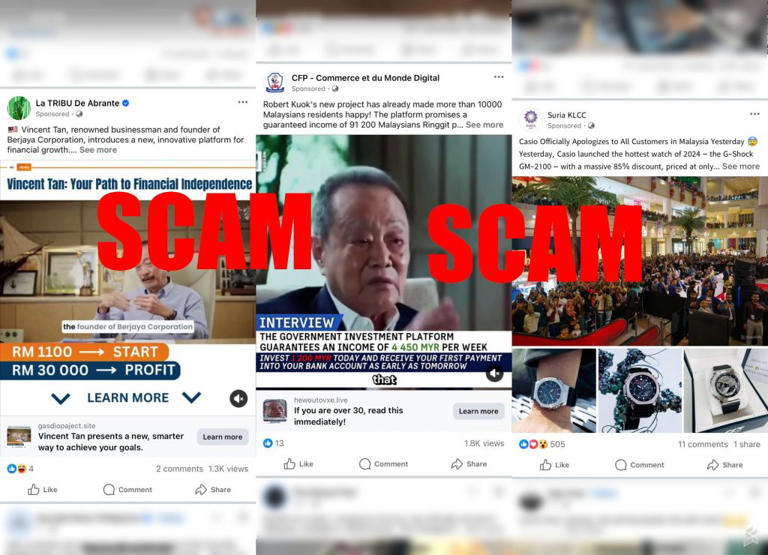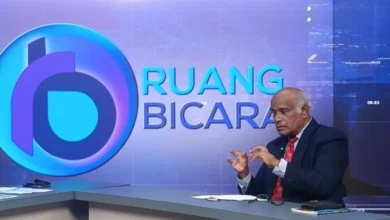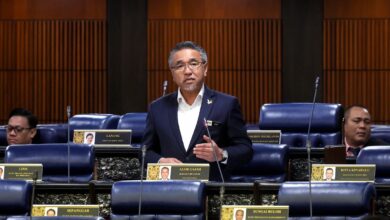Facebook Scam Ads: Malaysia to use Online Safety Act 2024 to hold social media platforms accountable
Facebook Scam Ads: Malaysia to use Online Safety Act 2024 to hold social media platforms accountable

Following the introduction of the new Social Media Regulation which took effect from 1st January 2025, we are still seeing scam and gambling ads targeted at Malaysian users. Despite attempts to get applicable platforms to register for the required Applications Service Provider (ASP) licence, only a handful of platforms have complied. Meanwhile, big social media giants such as X, Meta and Google, are still operating in Malaysia without a licence.
To hold social media platforms accountable for scams and online harm, the Malaysian government aims to use its upcoming Online Safety Act (OnSA) 2024 which is expected to be enforced soon.
During the World Telecommunication and Information Society Day 2025 celebration, Communications Minister Fahmi Fadzil has raised concerns about inaction by major social media platforms such as Facebook, in tackling scams and gambling advertisements on its platform.
As quoted by Bernama, Fahmi said, “There are many scams and gambling ads, yet Facebook hasn’t done enough to remove them – simply because scammers are paying for them”.
He added, “We’re waiting for the Online Safety Act to receive royal assent, and once it comes into effect, we believe that OnSA will play a pivotal role.”
DISYORKAN UNTUK ANDA :
- Bila Kuasa Raja Raja Melayu Di Persoalkan Di Mahkamah
- BN Menang Di Ayer Kuning, Tapi UMNO Masih Gagal Tangani Naratif UMDAP
- Keterangan Mahkamah Yang Berlainan Nada Antara Jasmin Loo Dan Roger Ng
With the new act, the Malaysian government wants to hold social media platforms accountable for the content they host and they would be compelled to share the responsibility of ensuring a safer digital environment.

The Online Safety Bill was passed in December 2024 and it will require social media platforms to meet three core responsibilities which cover platform safety, protection of children below 13 years old and restricting access to harmful content.
However, there are concerns about the lack of an independent oversight and the term “harmful” content is very broad and vague.
It is also worth mentioning that some of the big social media platforms don’t have an official presence in Malaysia. The bigger question is, will the new Act be effective in compelling these platforms to take content and ad moderation more seriously considering they have continued to allow scammers to use their platform to amplify their illegal activities.
Under the regulation, all social media and instant messaging platforms with at least 8 million Malaysian users are required to obtain a licence starting in 2025. TikTok and Tencent (WeChat) were among the first to be granted the ASP licence, followed by Telegram. The government has said that it has no intention to block unlicensed platforms but they may be subjected to fines and other actions.
DISYORKAN UNTUK ANDA :
- Maruah Negara Di Calar, Tanah Rakyat Di Jarah Tapi Hadi Tetap Sibuk Dengan Fatwa Politik
- Persamaan Antara Makcik Maimun, Pakcik Hamid Dan Uncle Tommy
- Cubaan Melucut Hak Milik UMNO Ke Atas PWTC Gagal
According to the MCMC, applicable service providers that continue to operate without a licence from 1st January 2025 can be slapped with fines under Section 126 of CMA 1998. This may include fines of up to RM500,000 or imprisonment of up to 5 years, or both. The illegal platforms can be slapped with further fines of RM1,000 per day during which the offence is continued after conviction.
Facebook Scam Ads: Malaysia to use Online Safety Act 2024 to hold social media platforms accountable
DISYORKAN UNTUK ANDA :
- Rafizi Akan Ulangi Sejarah Kejatuhan Tun Ghafar Baba Dalam Pemilihan UMNO 1993
- Implikasi Terhadap Kedaulatan Raja Melayu Sekiranya Mahkamah Menolak Titah Adendum
- Sikiittt Lagi PAS Akan Sucikan DAP
LAWATI LAMAN FACEBOOK KAMI :
Layari Laman Facebook MYKMU.NET
Kempen Timbalan Presiden PKR Dedahkan Wajah Sebenar Rafizi






You must be logged in to post a comment.